Peaceful Parenting Guide for Happier, More Cooperative Children
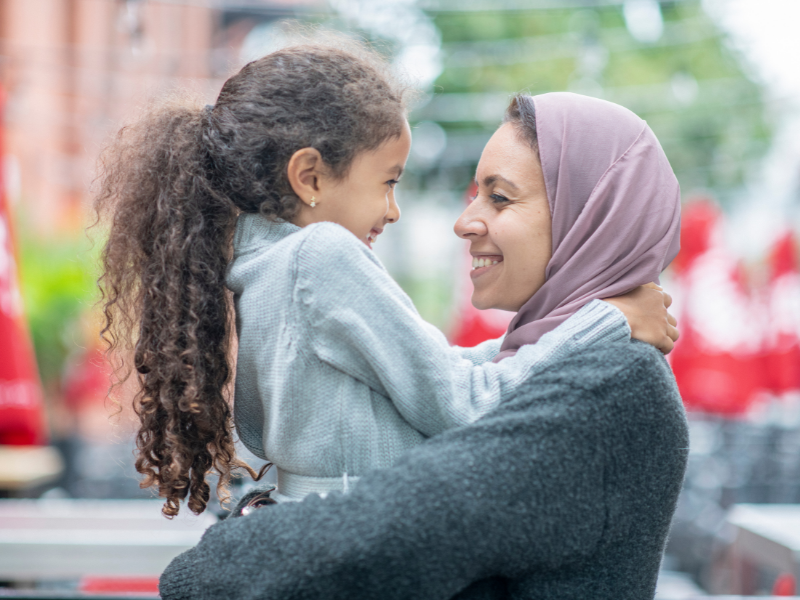
Published Date: 02/21/22
Peaceful Parent - Happy Kids
By Crystal Teegarden
If You Only Have a Minute
- Peaceful parenting is a relationship-based parenting philosophy developed by clinical psychologist and author, Dr. Laura Markham and is backed by science and child-development research.
- This parenting style is based on unconditional parental love, along with effective communication provided in a calm, understanding manner for happier, more cooperative children.
- Dr. Laura teaches that parents should learn to regulate their own emotions to minimize frustrations and to stop yelling. The goal is to foster collaboration between parents and children so they can solve problems together.
- It removes the power struggle dynamic between parent and child and favors conversations rooted in connection for a more peaceful home.
- This method utilizes a positive approach to discipline and eschews harsh punishment techniques, while still providing boundaries.
In This Article
What are the three components of peaceful parenting?
How does a peaceful parent discipline?
What are the benefits of peaceful parenting?
What are the drawbacks of peaceful parenting?
How does peaceful parenting differ from other parenting styles?
Why is peaceful parenting a good way to raise children?
Tips for becoming a peaceful parent
Recommended parenting books for a peaceful home
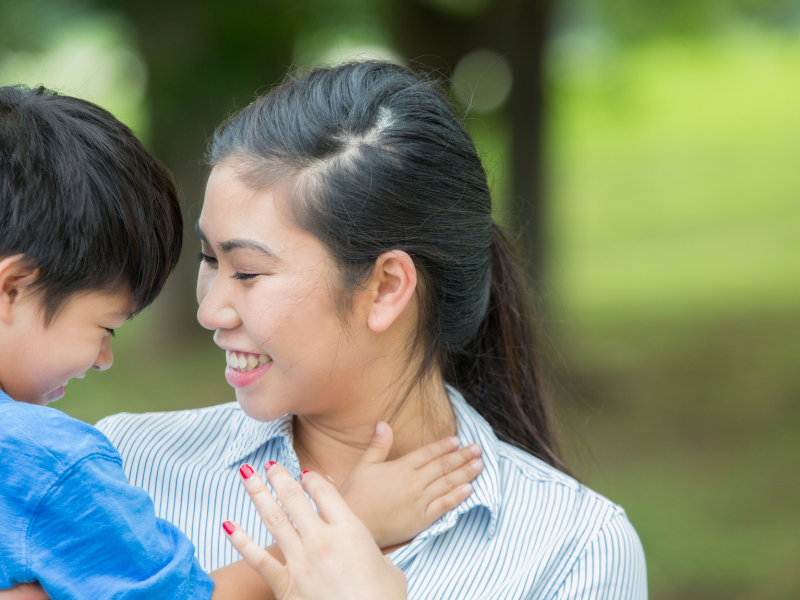
Connection-based parenting fosters strong bonds
What is peaceful parenting?
Peaceful parenting is an approach to raising children developed by Dr. Laura Markham, who has published three books on this subject. Emphasis is placed on developing strong bonds between you and your child, offering calm communication, as well as loving your child unconditionally.
As a parent, you develop your own emotional intelligence by regulating your emotions and reactions. By doing that work, parents naturally stop yelling, eliminating the power struggle, and are able to create an open dialogue with our children.
This philosophy refrains from harsh discipline techniques, while still providing solid guidance. It has strong ties to attachment parenting and is supported by research into best practices for a child's development.
What are the three components of peaceful parenting?
Practicing peaceful parenting starts with you, the parent. Your children are always watching and learning directly from you.
Dr. Laura developed "3 Simple Big Ideas" for peaceful parenting:
Learn how to regulate your own emotions. Children will learn how to react to different situations by how you respond when stressed, angry, or overwhelmed.
Connection with your child is crucial. Building a strong relationship built on love and trust will create a relationship of mutual respect and minimize conflicts.
Learn how to coach instead of being controlling. Too often, parents try to control their children to get them to behave, which creates tension and clashing.
What is parental self-discipline?
Parental self-discipline and self-regulation is the practice of keeping your own behavior and emotions in check before reacting to your child.
It requires you to step back and develop an understanding of what triggers you to react the way you do. This is often because of your own childhood and life experiences.
By practicing self-regulation when experiencing moments of frustration or anger, you can recognize and honor your own emotions, and control your reaction. Instead of yelling at your child, you can engage in a calm discussion about the events that are upsetting.
As Dr. Laura said, "Our ability to self-regulate might have the most impact on who our child turns out to be compared to anything else we do."
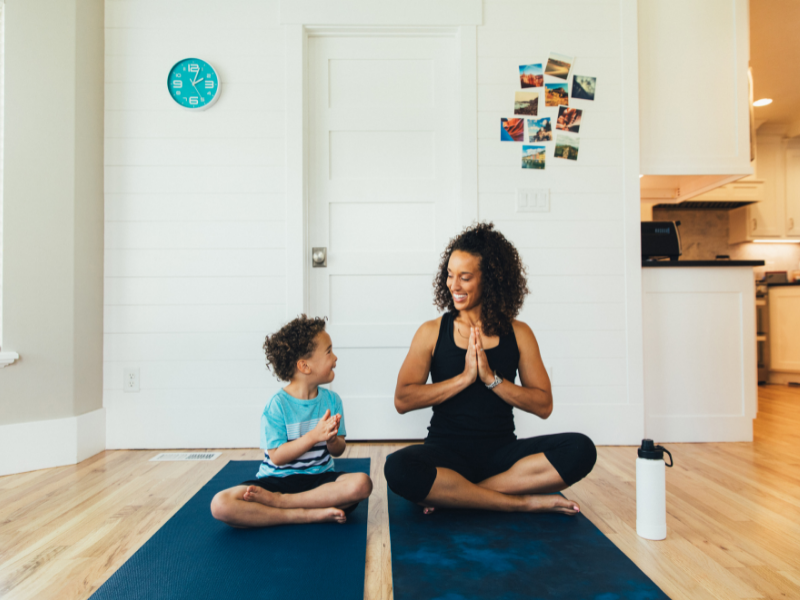
Emotional regulation is hard, especially if you grew uo wth parents who yelled frequently. Incorprating mindfulness can help you stop yelling, ultimately breaking the cycle.
How do you regulate your own emotions?
Parents can understandably get very frustrated when their children have meltdowns. Emotional regulation is challenging and takes a lot of practice, even for us adults.
We can't expect our little ones to do something that we ourselves struggle with. Your child does something you told them not to do and you're frustrated and angry. Sometimes you even yell.
But deep down you know that yelling makes kids feel worse, causes them to become more reactive, and makes them feel bad about themselves. It's confusing for young children who don't necessarily have the ability to do what is being asked of them, and your tangled up emotions are causing you to react harshly in the moment.
Instead of reacting out of anger, pause, and take some deep breaths to relax and create a sense of calm. Before saying anything, truly think about what's driving your emotions, collect your thoughts, and create respectful a dialog about the situation. This will prevent you from saying things that you might regret and help to create a better connection with your child.
It can help to remember that children's brains are still developing. They often can't do what is being expected of them (keeping their bodies still when they feel the urge to move, eating their veggies when their taste buds are telling them they are bitter, etc.) so pause and try to see things from their point of view.
"Eco friendly, safe, bpa-free - bamboo plates with lids"
How do you develop a strong parent-child relationship?
Developing a strong bond between you and your child begins early on. When you meet a child's needs - both physically and emotionally - powerful attachment bonds are formed.
As your toddler gets older, you must nurture the relationship to help it evolve. Your child will no longer rely on you for everything, but will still need your guidance and support.
When you snap at your child or feel bad for how you treated them in the heat of a moment, apologize and teach them that we all make mistakes and we can try to do better next time.
To ensure your relationship is strong, remember to coach instead of control. No one enjoys being controlled and it will generally result in more conflict. Coaching will actually teach your child how to make good decisions and feel empowered so they are more likely to cooperate with you instead of pushing back.
This means teaching your child how to approach situations, helping them learn how to properly express their emotions, allowing them to make mistakes, and refraining from harsh punishment when behavior doesn't meet your expectations. They should always know that your love for them isn't dependent on them performing a certain way.
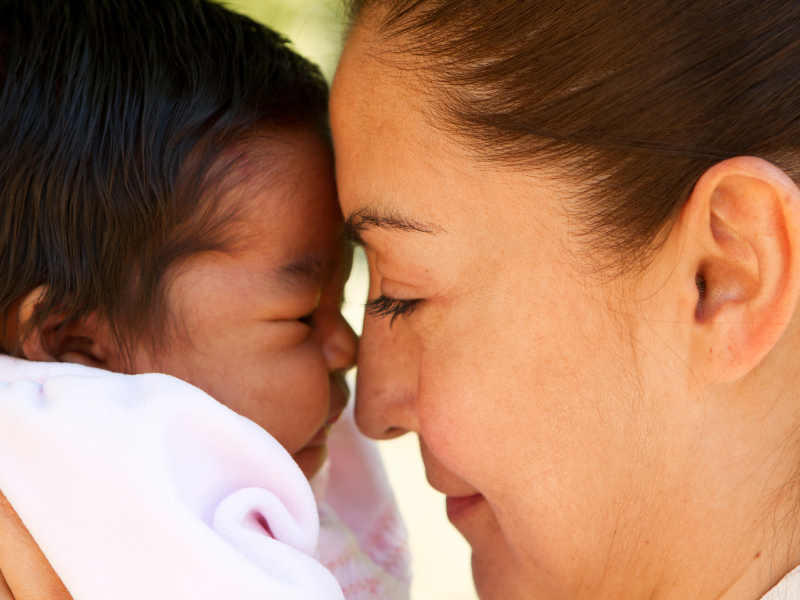
Strong bonds begin in infancy
How do you set appropriate limits?
Setting loving limits is a key component of peaceful parenting. While adults have decades of experience adhering to social norms, kids need to be explicitly taught expectations, and that's where setting limits comes in.
It's crucial that you practice empathy when setting limits - see the situation from your child's perspective before making decisions.
What limits are necessary for children?
There are really only a few essential limits, particularly when there is a threat of physical danger to children and those around them. By setting appropriate limits for children, we are teaching them how to set limits for themselves. This leads to your child having self-discipline, a necessary skill.
Safety - With toddlers, this could include always holding hands in a parking lot, but as they get older, it might evolve to a neighborhood radius where they're allowed to ride their bike alone. When it comes to safety, it is important to intervene immediately when a situation posing physical danger arises while remaining calm despite the fear or anger you might be experiencing.
Being respectful - With younger children, a limit might be not hitting or throwing toys at their sibling. As they get older, this might extend to how they interact on social media and how they treat classmates.
Physical health - As a parent, you'll set limits regarding eating healthy foods, sleeping habits, and dressing appropriately for the weather.
Community - Your community limits may include just your own household, or extend beyond. An example of a community limit would be cleaning up after oneself, and a young toddler wouldn't be expected to handle the same responsibilities as an older child. A broader community limit might be requiring your teenager to pick up after the dog when they take the pooch for a walk.
How does a peaceful parent discipline?
When a child has a secure attachment to their parent, they are less likely to develop behavior problems. Having a strong relationship based on love and mutual respect means that your child will be happier, more adjusted and more likely to want to work with you, not against you.
However, every parent will find that it doesn't matter how strong the bond is with their child, there are situations that require discipline.
Positive discipline is proven to be the most effective discipline strategy. It is designed to help your child understand that their actions are a choice and those choices, whether good or bad, have consequences.
Natural consequences are incredibly effective at demonstrating the effects of our actions, resulting in better choices in the future. One example of natural discipline is when your preschooler refuses to eat breakfast and then later, they are hungry when stuck in a long line with you at the post office. Or they insist on not wearing gloves and then their hands are cold at the park.
These are genuine and natural learning life lessons. Children don't need to be shamed but met with empathy, they will understand the natural consequences and be able to make better choices next time.
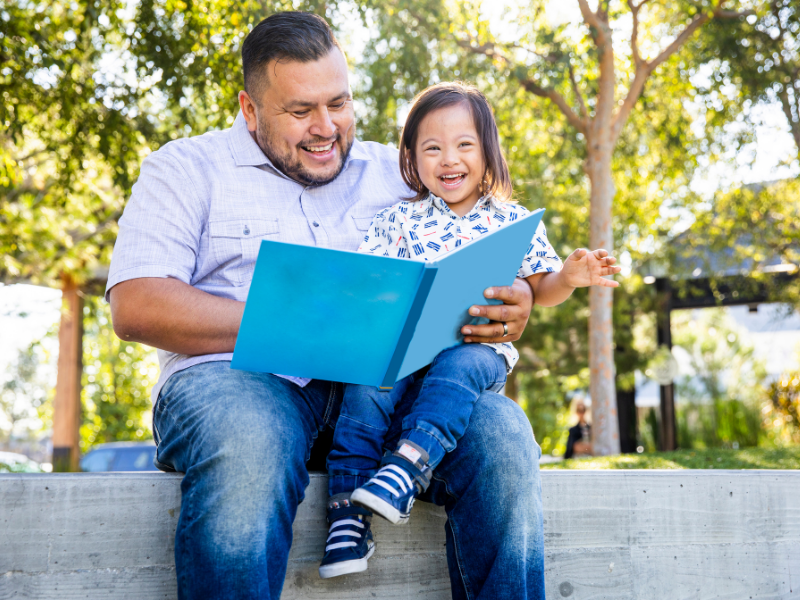
Reading to children reduces challenging behaviors and the use of harsh discipline among parents
What are the benefits of positive discipline?
Besides being proven more effective than other punishment techniques, positive discipline is superior to other punishment techniques as it:
- Helps children learn responsibility, problem-solving skills, cooperation, and self-discipline.
- Fosters mutual respect and trust between a parent and child, strengthens the relationship, and can actually help form neural connections in a child's brain!
- Teaches children that they have influence over many things that happen in life.
- Provides meaningful ways for children to contribute to their household, providing them with a sense of significance.
- Helps to build and maintain a child's self-esteem.
- Helps teach children emotional regulation.
- Gives children healthy ways to deal with stress and obstacles.
- Develops intrinsic motivation for meeting behavior expectations.
Whereas a relationship based on harsh punishment undermines a child's respect for authority, positive discipline is a terrific learning experience and has long-term benefits.
How do you practice positive discipline?
There are five criteria that discipline must meet to be effective:
- It is both kind and firm. This means the discipline is respectful and encouraging.
- It provides a feeling of belonging and significance. Children feel connected.
- It is a long-term solution. While punishment may change behavior temporarily, it has negative long-term repercussions.
- Builds character by teaching social emotional skills and life skills. This includes accountability, concern for others, respect, contribution, problem-solving, and cooperation.
- Helps children discover their capabilities and how to use them in constructive ways. Logical, natural consequences teach children about their personal power and autonomy.
Why is traditional punishment ineffective?
Traditional punishment is negative. It often includes yelling, time outs, isolating children, grounding them, and for some, physical punishment like spanking, or worse. It should be noted that the American Association of Pediatrics (AAP), the American Psychological Association, the American Psychoanalytic Association, and the American Academy of Child & Adolescent Psychiatry all oppose spanking and corporal punishment of any kind.
According to the AAP, "Aversive disciplinary strategies, including all forms of corporal punishment and yelling at or shaming children, are minimally effective in the short-term and not effective in the long-term.”
Ultimately, the objective with discipline should not be blind obedience and "good behavior." Instead, it should build an understanding of why specific behavior expectations exist and intrinsic motivation for children to meet those expectations.
When you yell and use traditional punishment, you're teaching the unintended lesson that your child should yell when they're angry with you. Or worse.
What are the benefits of peaceful parenting?
Peaceful parenting's benefits extend to both parents and children.
The primary benefit to parents is that it reduces stress on several levels. First, in tough moments, a parent takes time to regulate their emotions and react thoughtfully to a child's actions. Second, by strengthening the parent-child bond and through effective discipline, a child meets behavior expectations more often, making parenting easier.
For children, peaceful parenting has multiple benefits:
- It helps the child focus and troubleshoot issues when the parent is not present.
- It instills high regard for respect, composure, and trust.
- It provides more autonomy to kids.
- Children are often happier overall and better adjusted, which means there's a decreased chance that they'll grow up to be unhappy adults.
- Helps children develop emotional IQ and self-discipline.
- The bond developed with parents is the reason children cooperate.
Peaceful parenting will enable you to raise a curious and loving little human with better self-discipline and judgement.
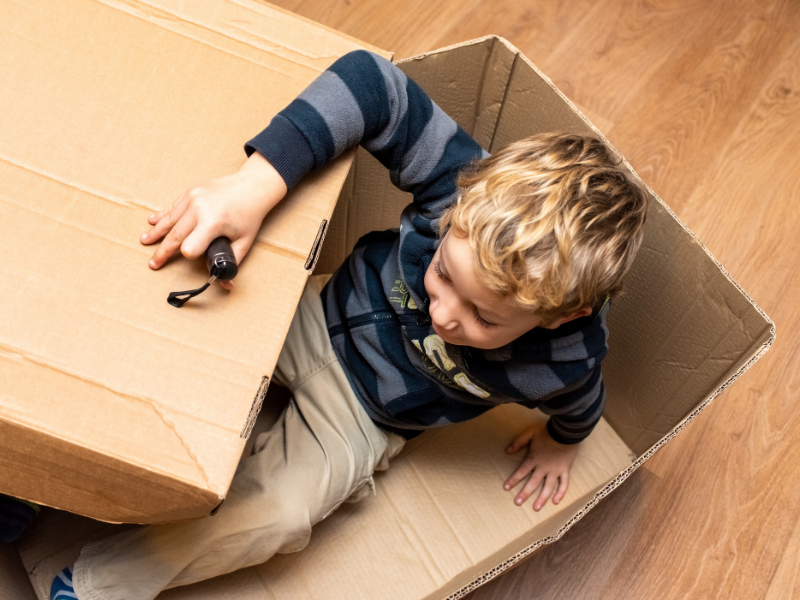
"Parenting isn't about what our child does, but about how we respond." - Dr. Lauran Markham
What are the drawbacks of peaceful parenting?
Since peaceful parenting is rooted in child development best practices, there are not many drawbacks. However, some parents do struggle with the approach.
The drawback is that, quite frankly, it's hard.
As an adult, our own feelings, behaviors, and reactions are somewhat ingrained. Change is difficult. It takes significant soul searching and for some, professional therapy, to understand what drives your response, and changing those responses is a lot of work.
If you live with a partner, it also takes their support and commitment. While positive parenting isn't useless if only one parent practicing it, it's much more successful when both are dedicated to it.
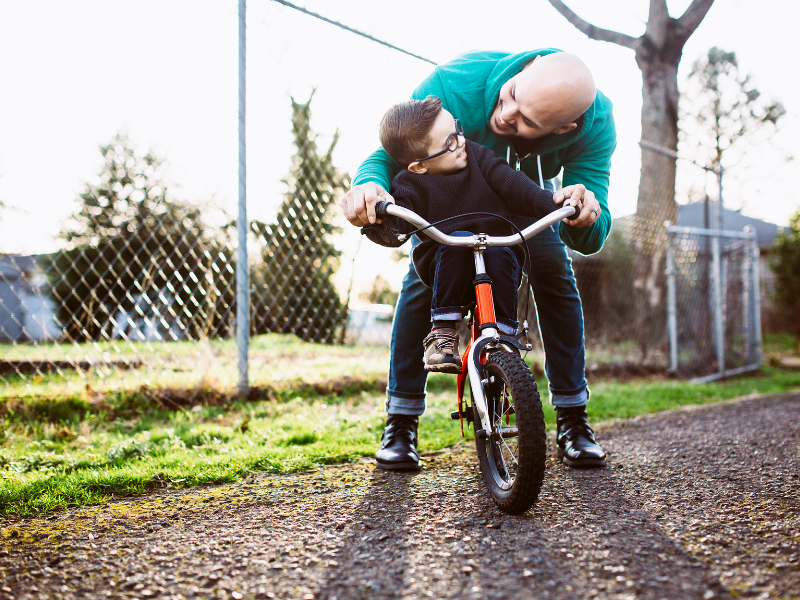
Your approach to parenting will significantly affect developmental outcomes
How does peaceful parenting differ from other parenting styles?
While there are many approaches to raising children, there are four main parenting styles that are recognized by child psychologists. They are based on the work of developmental psychologist Diana Baumrind and Stanford researchers Eleanor Maccoby and John Martin.
- Permissive parenting: Overindulges children to avoid conflict, few, if any, rules and those rules are rarely enforced.
- Authoritative: Open lines of communication, natural consequences, problem solving, clear rules and expectations.
- Neglectful: Uninvolved, little nurturing or guidance, indifference to a child's social emotional needs.
- Authoritarian: Strict rules and harsh punishments, obeying is most important, monologue rather than a dialogue.
You may have also heard of attachment parenting. Many see attachment parenting as a subset of authoritative parenting. It focuses on being responsive to your baby's needs, nurturing through touch and promotes co-sleeping and baby wearing.
Peaceful parenting is most closely aligned with the authoritative approach. It differs in that with authoritative parenting, parents engineer the rules but with peaceful parenting, children have input.
Why is peaceful parenting a good way to raise children?
When parents yell and use physical punishment, children learn that these are the appropriate reactions and responses when frustrated and then reflect these behaviors back.
This ultimately creates a cycle of unhappy kids and unhealthy and unproductive power struggles. Such lessons are the wrong lesson to teach, undermine emotional intelligence, increase challenging behaviors, and cause children to act worse.
In addition, when children misbehave, your own loving guidance and calm response increases a child's ability to stay calm when they meet adversities, and every child deserves to be equipped with strategies to succeed.
Dr. Laura's approach is for deeply loving parents and grounded in human development. When a parent commits to it, it can:
- Help you become an emotionally generous parent
- Foster a strong parent-child connection
- Enable you to provide loving guidance
- Prevent physical discipline
- Encourage cooperative behavior in children
- Give practical tools to use when a child's behavior doesn't meet expectations
Tips for becoming a more peaceful parent
Connect before you correct. Many times young children simply lack the skills needed to meet our expectations and they need more gentle guidance and patience.
When you feel overwhelmed, stop and pause before reacting. Try to see things from your child's perspective. Sometimes the only reason they are acting out is because they need connection. Undivided attention (without screens) can go a long way to calming a cranky kid.
We can be triggered when we see our children behaving in a way that was not allowed in our own childhood. You can help heal your inner child raising children the way that you know you deserved to be treated when you were younger. Through connection and empathy, we can teach our children and work through our own feelings.
Be conscious about how you treat your children and how you make them feel. How you treat them is how they will learn to treat themselves.
Children shouldn't be made to feel that they are bad when they have a hard time expressing their big emotions. While parents always want to encourage good behavior, it is important that we give our child loving guidance and make sure that they understand that we love them no matter what.
Recommended parenting books for a peaceful home
These books provide great advice for the whole family.
Peaceful Parent, Happy Kids: How to Stop Yelling and Start Connecting
The Whole-Brain Child: 12 Revolutionary Strategies to Nurture Your Child's Developing Mind
No-Drama Discipline: The Whole-Brain Way to Calm the Chaos and Nurture Your Child's Developing Mind
How To Talk So Kids Will Listen and Listen So Kids Will Talk
How to Talk so Little Kids Will Listen: A Survival Guide to Life with Children Ages 2-7
Peaceful parenting FAQs
What is the gentle parenting approach?
This gentle approach to parenting develops a partnership between you and your child. It's aimed at building intrinsic motivation in children, rather than adhering to behavior expectations because of rewards or external pressures.
How do I start gentle parenting?
- Use these tips to become a gentle parent:
- Build strong bonds with your children
- Maintain an open dialogue
- Set clear expectations
- Use specific positive reinforcement
- Take a positive approach to discipline instead of using traditional punishments
- Build intrinsic motivation in children to meet behavior expectations
- Provide autonomy and choice to your children
What is CALM parenting?
The CALM approach to parenting is a four-step process to communicate with children and build connection.
CONNECT: Provide your children your undivided attention when you're speaking to them.
AFFECT: Share your feelings and emotions to build empathy.
LISTEN: Listen to what your children are saying and get clarification.
MIRROR: Paraphrase what your children are saying to ensure you fully understand.
Is it too late to switch to gentle parenting?
It is never too late to start gentle parenting.
The first step is strengthening your relationship with your children so they want to work with you. Own up to past mistakes and instead of simply punishing them like in the past, develop ways to help them understand how their actions affect others.
It will take time but you can help your children to feel a stronger connection with you so they want to follow your lead.
As Dr. Laura said, "Our job as parents is bigger than teaching kids to be scared so they don't do the wrong thing. Our job is to teach kids to WANT to do the right thing."
That's the magic of peaceful parenting.
By Crystal Teegarden
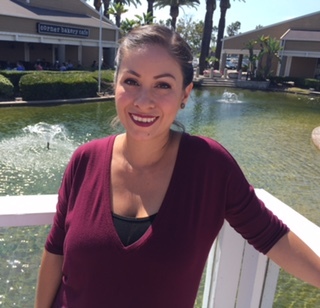
Crystal is a gentle parenting mama who loves reading, cooking, and exploring new trails with her husband and son. She is from Los Angeles but currently lives in Portland, OR where she is eating all the vegan food.
Paper Pinecone is the #1 most trusted childcare directory giving parents access to the best preschools and best daycares near you. Parents always search free and childcare providers always list free. Send inquiries about the best daycares and preschools to [email protected].
This post contains affiliate links.